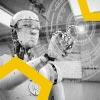Shubhanshu Shukla’s Return: Axiom-4 Splashdown Scheduled for July 15, Confirms Jitendra Singh

News Synopsis
Union Minister Jitendra Singh shared a significant update on the Axiom-4 mission, stating that the four astronauts currently on board the International Space Station (ISS) will return to Earth via splashdown on July 15 at 3:00 PM IST.
Shubhanshu Shukla Set to Return to Earth After Historic ISS Mission
The astronauts—Shubhanshu Shukla, Peggy Whitson, Sławosz Uznanski-Wisniewski, and Tibor Kapu—will undock from the Harmony module's space-facing port inside SpaceX’s Dragon spacecraft on July 14 at 4:30 PM IST.
“As of now, undocking has been scheduled for tomorrow, 14th July at 4:30 PM IST. Arrival back to earth…. splash down scheduled for 15th July at 3:00 PM IST,” Union Minister Jitendra Singh posted on X.
“These timings have a margin window of approximately 1 hour. Further update, if any, shall be shared accordingly,” he added.
The splashdown is planned off the coast of California in the Pacific Ocean, several hours after undocking.
Shubhanshu Shukla: First Indian to Visit ISS
H3: A Milestone Mission for India’s Space Program
IAF Group Captain Shubhanshu Shukla made history as the first Indian to board the ISS and the second Indian astronaut in space, after Wing Commander Rakesh Sharma in 1984.
On his 14-day orbital mission, Shukla conducted seven India-specific scientific experiments, contributing vital data for India’s Gaganyaan human spaceflight program and the upcoming Bhartiya Antariksha Station.
India-Led Experiments on ISS: A Major Leap in Space Research
H3: Groundbreaking Research With Long-Term Space Goals
During the mission, the crew—including Shukla—performed several notable experiments such as:
-
Tardigrade Survival Studies: Focused on survival, revival, and reproduction of the Indian strain of Tardigrades.
-
Transcriptome: Myogenesis: Studied how human muscle cells respond to microgravity.
-
Sprouting of Moong and Methi Seeds: Aimed at evaluating crew nutrition strategies in space.
-
Cyanobacteria Experiment: Analyzed the growth of two cyanobacteria varieties, relevant to life support systems.
These experiments represent a significant stride in space science, offering crucial insights for long-duration space missions, human spaceflight adaptation, and bio-regenerative life support systems.
Post-Mission Recovery Plan for Astronauts
7-Day Rehabilitation Program After Landing
Following splashdown, Shubhanshu Shukla and the rest of the Axiom-4 crew will undergo a seven-day rehabilitation program under the supervision of Flight Surgeons. This phase will help astronauts readjust to Earth’s gravity after spending days in a microgravity environment aboard the ISS.
Conclusion: A Historic Step Toward Gaganyaan and Beyond
The Axiom-4 mission stands as a landmark chapter in India’s space exploration journey. Shubhanshu Shukla’s return from the International Space Station (ISS) not only signifies India’s growing presence in the global space community but also marks a powerful stride in the nation’s pursuit of independent human spaceflight capability.
As the first Indian aboard the ISS and the second Indian in space, Shukla’s role has been pivotal in executing critical, India-specific scientific experiments in microgravity. These research initiatives—ranging from studying muscle cell development and seed sprouting to analyzing cyanobacteria and tardigrades—will provide essential data for India’s Gaganyaan mission, the Bhartiya Antariksha Station, and future interplanetary missions.
His 14-day mission has laid the groundwork for future Indian astronauts, boosting indigenous capabilities in space science and life support technologies. As the country awaits his splashdown on July 15 at 3:00 PM IST, India takes pride in a new era of ambitious and self-reliant space exploration.
You May Like









